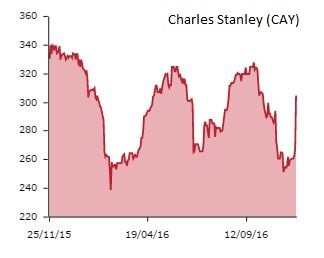
Charles Stanley (CAY) chief executive Paul Abberley says the wealth manager’s turnaround is gaining momentum as cost cuts and a rotation towards higher margin services start to feed through to the bottom line.
Shares trade 15.5% higher at 309p.
A new remuneration package for investment managers, which involves issuing shares in the company to staff, has also been approved by 90% of Charles Stanley’s team.
Underlying profit-before-tax gained 20% to £4.2m in the six months to 30 September 2016.
Revenue declined marginally as trail commissions dropped out of the fee mix and funds under management and administration (FuMA) gained 13% to £22.5bn.
MAINTAINING MOMENTUM
‘Half year results show we are maintaining the momentum of the turnaround strategy,’ said Abberley.
‘Away from the financials, we have completed the remuneration discussions with investment managers and 90% have agreed to the new arrangements so that is a major step forward, underpinning our private client platform and giving us a strong base to go out and grow revenues.
‘We have four client-facing divisions and a lot of work has been going in to put the foundations to grow the business.’
Abberley added the company was still in discussions with the 10% of investment managers who have not yet agreed to the new remuneration structure.
‘We can’t rule out an impact on FuMA if some choose not to accept the deal with us but we would expect organic growth to offset that to an extent,’ added Abberley.
Movements in FuMA included £700m of client inflows and £700m of outflows, mainly driven by investment manager departures.
Positive market movements of £2bn accounted for the majority of the 13% year-over-year gain to £22.5bn.
TURNAROUND STRATEGY
Discretionary Managed, a key focus of Abberley’s strategy, increased 19% year-over-year and totalled £10.6bn.
Abberley took charge at Charles Stanley in December 2014 after a half-year results update which saw underlying profit-before-tax plunge to £1.5m from £8.0m a year earlier.
Attempts to turn around the business are focused on returning operating margins to double digit levels via a rotation from administered to discretionary managed services, lower costs and investment in key infrastructure.
Future financial market performance is also likely to play an important role on profitability, Abberley admits, because wealth managers typically earn fees based on the level of client assets under management or administration.





